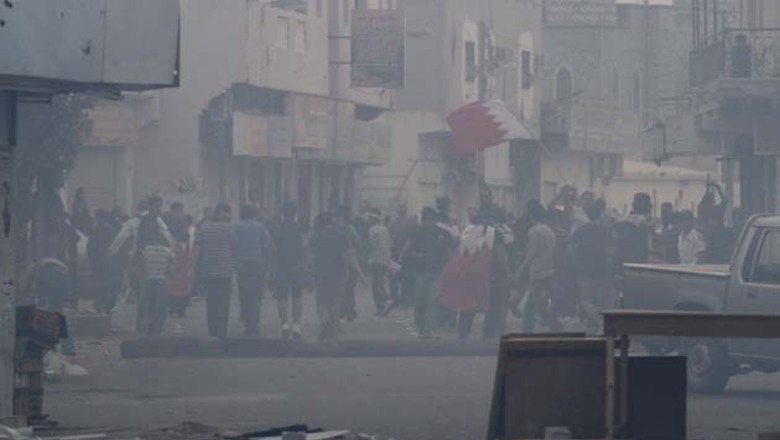
views
Manaman: The discovery of a protester's body near the scene of clashes has threatened to tip Bahrain deeper into unrest as a 14-month-old uprising overshadows the return of the Formula One Grand Prix to the strategic Gulf kingdom.
Bahrain's Sunni rulers have pressed for the race to be held as a chance to rebuild their credibility on the world stage after it was called off last year as police and army troops cracked down on dissent.
Persistent protests, however, have left the monarchy struggling to keep attention on Sunday's Formula One race — Bahrain's premier international event — as the country's Shiite majority pressed ahead with a campaign to break the near monopoly on power by the ruling Sunni dynasty, which has close ties to the West.
At least 50 people have died in the conflict since February 2011 in the longest-running street battles of the Arab Spring.
Protesters again took their grievances to the streets nationwide on Saturday after opposition groups said that a man was killed the day before during clashes with security forces. A statement by the Interior Ministry said the man who died was identified as Salah Abbas Habib Musa, 36.
"Down, Down Hamad" and "We don't want Formula One," the protesters shouted in reference to King Hamad bin Isa Al Khalifa. Confrontations between police and anti-government protesters turned violent in the Shiite opposition stronghold of Diraz, northwest of Manama. Opposition supporters set tyres ablaze and riot police fired tear gas to disperse them. No injuries were reported on Saturday.
Musa's body was found in an area west of the capital, Manama, where clashes broke out after a massive protest march on Friday. Opposition factions said riot police and demonstrators were engaged in running skirmishes around Shakhura, a village about 10 kilometres west of the capital Manama that is known for its burial mounds dating back more than 5,000 years. His funeral could be held on Sunday if his family recovers his body, setting the stage for riots on race day.
Musa's death threatened to sharply escalate tensions in the island nation, which is home to the US Navy's 5th Fleet. Opposition leaders claimed Musa was targeted by the security forces because he was a prominent activist in the opposition February 14 movement, which has been the driving force of Bahrain's Shiite revolt.
After the announcement, thousands marched on a main highway leading out of the capital. The heavily-guarded Bahrain International Circuit, where the F1 teams have practiced ahead of Sunday's race, was about 30 kilometres away from the demonstration. Some banners held up during the march depicted Formula One race car drivers as riot police beating up protesters.
Race drivers have mostly kept quiet about the controversy surrounding the Bahrain GP. Asked about Musa's death after taking pole position in Saturday's qualifier, F1 world champion Sebastian Vettel said, "I think it's always dreadful if someone dies." He looked forward to getting in the car and dealing with the "stuff that really matters - tyre temperatures, cars".
Bahrain's monarchy is the main backer of the F1 race, and the crown prince owns rights to the event.
Bahrain was the first Middle Eastern country to welcome F1 in 2004. Members of the ruling Al Khalifa dynasty are huge fans of the sport and the country's sovereign wealth fund, Mumtalakat, owns 50 percent of leading team McLaren.
Bahrain's leaders lobbied hard to hold this year's event in efforts to portray stability and mend the country's international image despite almost daily and increasingly violent confrontations between security forces and protesters.
The rulers have billed the F1 race as an event that will put the divided society on the path of reconciliation. They vowed zero tolerance for unrest and repeatedly warned the opposition against sabotaging Bahrain's racing weekend, which will draw a worldwide TV audience of about 100 million in 187 countries.
Backed by international rights organizations, opposition groups had called for the sporting event to be cancelled again, claiming that going ahead with the race in Bahrain would give international legitimacy to the monarchy and its crackdown.
Besides the deaths, hundreds have been detained and tried in secret at a special security court. Dozens have been convicted of anti-state crimes.
Eight prominent opposition figures have been sentenced to life in prison on charges of trying to overthrow the state, including rights activist Abdulhadi al-Khawaja, whose two-month and counting hunger strike has galvanized the Shiite resistance in the past weeks. His family says he stopped taking water on Friday, raising fears for his life. Foreign Minister Khalid bin Ahmed Al Khalifa said on Twitter: "I wish the hunger striker comes back to his senses. Nobody wants him to die."
Shiites account for about 70 percent of Bahrain's population of just over half a million people, but claim they face widespread discrimination and lack opportunities granted to the Sunni minority. The country's leaders have offered some reforms, but the opposition says they fall short of Shiite demands for a greater voice in the country's affairs and an elected government.
King Hamad bin Isa Al Khalifa, who will attend Sunday's race, said in a statement overnight that he wanted "to make clear my personal commitment to reform and reconciliation in our great country. The door is always open for sincere dialogue amongst all our people."


















Comments
0 comment